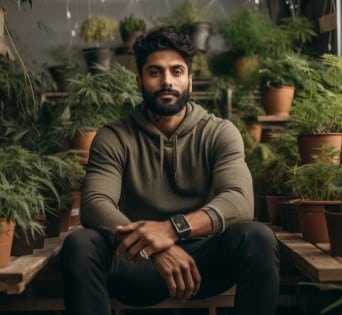Neatly summarizing Barinder Rasode and her accomplishments in just a few sentences would be impossible. She served two terms as a city councillor in Surrey, for starters. An advocate for women in leadership positions, Rasode is one of the founders of the conference series SheTalks, in which inspirational women share their stories. She is also the CEO of Grow Tech Labs, which provides services for legacy cannabis businesses that want to enter or expand their reach in the regulated marketplace.
When CannCentral reaches her at her office—which, in what will come as no shock in these pandemic days, is currently in her bedroom—Rasode says that one principle has guided her in all of these varied ventures.
“Serving community, and building community, is really important to me,” she says. “So, whether it was being a volunteer with the RCMP or advocating for women or for better transportation in Surrey, or in my role on the police committee advocating for more community-based policing, I have asked myself this question quite a bit: how can you be doing so many things, and what’s your core value that you go back to, to make sure you’re doing the right thing? And that is being a part of mobilizing change that serves the community or builds a better community; that’s what I’m really driven by.”
Rasode is justifiably proud of her work in the cannabis sector, and a large part of that has been normalizing the use of cannabis as medicine, which lifts the stigma from both those inside the industry and those who rely on what it produces.
“People don’t need to mask or hide the fact that they’re consuming cannabis, so we’re seeing more seniors who are open about cannabis use,” she says. “I’m definitely seeing more women in my circle who now do say that they use cannabis for insomnia or issues related to menopause or as an anti-inflammatory for aches and pains. And I do think that it took very different voices to move that needle, and I was just one of the voices in that space.”
What has Rasode especially animated these days is the work being done at the privately owned plant-science research centre that Grow Tech and ETC3 (Emerging Technologies Centre of Canada and China) operate on the UBC campus. “We’re working with cannabis, psycho-active plants, and psychedelics, and a lot of traditional medicines that came out of either Ayurvedic or Traditional Chinese Medicine, or most Indigenous cultures around the world,” she explains, noting that, although a large body of research on psycho-active plants does exist, much of it has been ignored or suppressed due to the legal status of the substances in question. That, of course, is starting to change, as evidenced by high-profile studies on the uses of psilocybin and MDMA to treat PTSD and other conditions.
“Now, when we face before us a horrid opioid crisis, and people are rightly no longer trusting pharmaceuticals for wellness—both because of their addictive qualities and because of the side effects—people like me are searching for something new to be able to treat medical conditions,” says Rasode.
Born in India, where plant-based medicine has been practised for centuries in the Ayurvedic and Unani traditions, Rasode says that the subject hits especially close to home for her.
“The concoctions my great-grandmother or grandmother would cook up for ailments—everything from a cut to a headache to anxiety—they worked, and they made sense,” she says. “All of that was shut out, so opening the door is really important.”
















